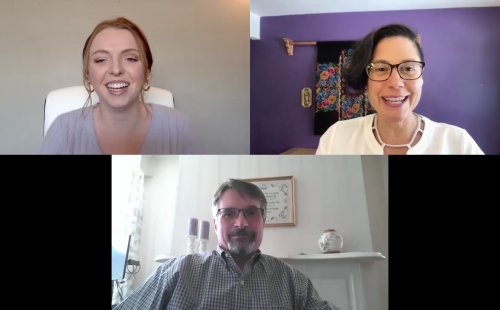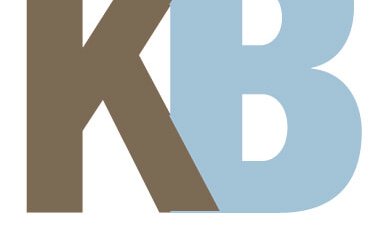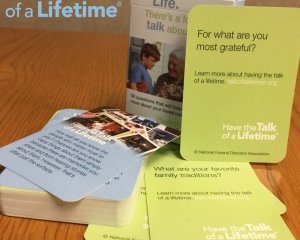Transcript from our video interview with Eric Keyser at Keyser Funeral Service
Heather:
Hi everyone. And thanks for checking in with us at Funeral Innovations: Trends, Tips and Technology, where we chat with leaders in the profession to discuss marketing trends, business tips, and technology innovation. Plus, we talk about how digital marketing helps you better serve your families. I am Heather Mierzejewski. I am the marketing director here at Funeral Innovations.
Joey:
And I’m Joey, I’m the marketing and design coordinator at Funeral Innovations.
Heather:
And today we’re happy to have Eric Keyser from Keyser Funeral Service on to chat with us today. Hey Eric.
Eric:
Hi. Thanks for having me.
Heather:
Thanks for being here. So to kick us off, will you tell us a little bit about yourself who about your business, where you are, who you serve, that sort of thing?
Eric:
Sure, sure. We’re in Kingston, New York for those that are familiar with New York city where we’re 90 miles North of New York city, we’re on the West shore, right on the Hudson river. Beautiful area to the foothills to the Catskills which was made me famous years ago. And then we’re right on the Hudson river, of course, named after Henry Hudson. I’m fourth generation funeral director been in a business for 40 years where a small family business. My son has come into the business about 10 years ago 10 plus years ago now. And he is really the managing person that the person in charge he’s he’s first stop. That’s what we, we do now. And I’m here to be a support to him, help him with what he’s doing. And one of the things that I’ve really enjoyed is it’s given me the opportunity to work with groups like Funeral Innovations and what’s going on in the industry and learn a lot and then institute those things into our, our business. And it’s been extremely helpful. We’ve grown our business over the last five to eight years. But we run into the same issues that a lot of other funeral homes run into like call volume changes. So we’ll talk about those things I’m sure. Yeah.
Joey:
And so could you talk a little bit about how you guys were impacted in the early days of the pandemic?
Eric:
Sure. you know, interestingly enough as I mentioned, I’m not the 24/7 person that I, that I used to be 365 and a group of buddies and, and myself, we were able to go to skiing as soon as we got back almost the day after everything was closed down. And that’s when the reality of this is serious with what’s going on with with COVID-19. So from a personal standpoint, I saw what was happening in Europe. And as we went through across, the borders and everything we had to do with customs and everything, I didn’t have any anticipation of how severe it was it was going, going to be. I don’t know that anybody in our area area did New York city for quite a while, was the ground zero epicenter of, of COVID. I have very good friends that have businesses down in the city and they were on unbelievably impacted. Call volume, just went through the ceiling, having to turn families away. Just very, very, very difficult situations. Initially, we were okay up here as far as our business goes and is concerned, but it eventually came up here to Ulster County being, being so close. Our volume is about 20 calls a month. We were hitting 30, 35 calls a month. We almost couldn’t handle the volume our ourselves. It, it became a very, very stressful and difficult time. One of the rewarding things was we were able to help some friends of friends who were down in the city and that, that was a rewarding experience for us to be able to not be in the epicenter, but at least to be able to help help folks. So, yeah,
Heather:
I’m not sure I’ve ever heard of a funeral home turning, having to turn people away before that. I’m sure that just goes directly against kind of everything that you guys stand for, that funeral directors in general. They just don’t want to do that.
Eric:
Yeah. For a lot of reasons, but it’s also our, our calling and often what happens is that we understand what families are going through. We understand the burdens and maybe even the financial hardships. And we work with families all the time, whether they have the resources or don’t have the resources to create a tribute to their loved one. And to be at that point where we, we were really at our breaking point. It’s, it’s tough to have to get there, but unfortunately, one nursing home where COVID got into the facility and really went through the facility like wildfire. Yeah, that was very, very difficult. Yeah.
Heather:
And then you just had to wait until the case count kind of dropped in order to level out the business.
Eric:
Right. That’s that’s what happened. Yeah. So it was a big, big spike we did in about 80, I forgot the exact number of days, but we did over 90 calls in 80 days. We just, for a small firm, it’s just, you know, and then what’s, what’s happened a lot of details and I could go into a lot of, a lot of different things, but I feel very fortunate that New York State Funeral Directors Association really stepped up to the plate, was our liaison with our state and working with our health department. And we became where we, we are, which we always knew we were, but we were finally recognized as essential workers, part of the, part of the chain of, of end of life. And so it was, it’s rewarding that we had a table at a seat at the table and, you know, kind of feel good about that. And I think that speaks to the integrity of our field that 99% of the, I think that people that are in funeral businesses want to do the right thing. And that’s what they’re trying to do. You always have that 1%, that’s going to make it on the media, but you know, it’s good.
Heather:
Let’s fast forward to the present. What are things like for you guys now, and what’s really working for your funeral home?
Eric:
Well, I feel there’s a lot of things that are really working for our funeral home. Where we’ve been impacted and where I think a lot of other firms in New York state, I’m not sure about the Northeast, because we were really the epicenter up here for awhile. I’m not sure about other parts of the country, but we’ve had this trend of families opting for limited services or no services. And COVID-19 has really accelerated that. There’s a lot of reasons for that, public safety, ease of doing things. I say, “ease” of doing things because we, we know in the field that it’s the it’s, it’s not whether you choose burial or cremation or what casket you use or it’s, it’s a ceremony. It’s the gathering, it’s the social process. I mean, that’s, what’s so I think back to my family and just, just recently close member of our family passed, and we were precluded from gathering. He lived in a town on the Western part of New York state, but we couldn’t have a gathering and we couldn’t do what we feel is normal and it’s a social process of gathering and remembering. So that was circumvented for us. So we’re trying to come up with ways that we can promote services, promote safety, and it’s difficult. We belong to an organization that is extremely helpful to us Selected Independent Funeral Homes. There’s a plug for them and we have a great network that we can reach out with questions and share what’s working. What’s not working that type of thing. I’m not sure if I answered the question, but yeah.
Heather:
Yeah. Is there something that you’re finding that really is working right now for you guys?
Eric:
Yeah. Funeral Innovations. There’s a plug for Funeral Innovations and I’m not making that plug, but the, if it wasn’t working, I would say it wasn’t working for us. But we decided five plus years ago that we really needed to increase our online presence. We could see that social norms were changing, you hear these stories all the time, you know, church groups, fraternal organizations, service clubs, they’re not meeting, they’re not doing the things that they used to. How do we outreach to the, to the community? And we were very fortunate to have entered into a great relationship, but then all the things that Funeral Innovations has been able to do for us whether it’s the the newsletters, the family followup series, all those things have given us such a way to connect with families. The integration that they’ve done with other services really helps us meet families needs and they know they can reach out to us, we’re there for them. And so I’m not sure that it’s anything new, it’s just accelerated that that entire process is what it’s done.
Heather:
Oh, that makes sense. Yeah.
Joey:
And so kind of in that same realm of reaching out to your community and engaging with your families switching gears, like, can you talk a little bit about your charitable giving and your community involvement that your firm participates in?
Eric:
Yeah, we’ve always been very involved in our, in our community and charitable organizations. What we’ve we’ve found is that groups aren’t meeting, but they still have great needs. There’s a organization in town Benedictine Health Foundation, which does a phenomenal job of quite a few things I do do, but one of their biggest outreaches is helping families that their loved one has cancer, but then helping with little needs, like shopping traveling, you know, all kinds of services. And they need a lot of funding for that and we’re able to step up and help them in different ways. So that’s one of the more recent ones that we’ve really been involved in, but we’ve been involved in our service clubs like Quantis than charitable groups, like United Way, serving on our boards of one of our local home health agencies, our hospice is much different than most other states. The way it’s run. But but getting together for meetings has been, been very difficult. So Zoom stuff like this and, you know, get, get together. So, so those changes, but I’m still trying to be there out front and help wherever we can make donations, but there isn’t the hands-on that there used to be. I’d say we’re more of a hands-on firm Does that make sense? I don’t know.
Heather:
Yes, it does. How would you say that that sort of involvement helps the charity and helps you, like, does that foster relationships with your community?
Eric:
Oh, sure. Yeah, the, the, the difficulty is that, that it used to be, you got together for meetings and you’d sit there and you’d work through things. And one-on-one, face-to-face being in a small, small community. Now it’s getting on a go to meeting or a Zoom or something, then, then working through things. But what’s, what’s happened is we can’t run the events that we used to run because you just can’t, we’re not allowed to, by the laws. So we can’t have large gatherings. And that’s the issue that we run into with the funeral home. It’s based on capacity, not of the funeral home, but capacity per room. So that becomes a real sticky, wicked. And how do you have a service and have more than 50 or 60 people, you know, even churches run into the same thing. And so it’s very hard. So we’ve, we are, and we have come up with, I wasn’t exactly part of this, but I was part of the organization Quantis Club, and they actually did a drive-in movie. So when we were able to set that up as a fundraiser and work it out was pretty cool the way they did it, but I wasn’t on that committee and everything, but that’s one of the innovative things that I’ve seen, seen done. So, yeah. Yeah.
Joey:
That’s awesome. Could you talk a little bit more specifically about the giveaways you’ve done?
Eric:
I think, yeah. That’s where our biggest outreach has been, which has been it’s been a lot of fun and the giveaway we worked with with Jackie I, through the everybody know Jackie is with Funeral Innovations and I threw the idea by her and she said, yeah, I think we can come up with something. There was no hidden agenda with what we were doing. You could enter the contest. And the contest was based on, we were supporting local restaurants and each week for a period of I forgot how many weeks weeks now we would donate gift certificates to a restaurant and people had to enter a contest and then randomly selected. And then, and so it was it was a feel-good thing. Does that make sense? What how I’m saying, how that was done? It was on Facebook, there was ads. We promoted the ad. We supported our local restaurants, like Little Italy and Chops. And specifically as some restaurants, then we left it open for people to choose their own and they could win. And they were going to get a $50 gift certificate. So once a week we were donating a hundred dollars. Last I checked where somewhere around $1,500 that we’ve done in that way giveaway and just a feel good type thing, and a lot, a lot of response from it, a lot of positive stuff. In fact, interesting. Now that I’m thinking about it a little bit more I was, we had stopped the program over the summer for a few weeks, and I know there’s one guy that owns a restaurant. I’ve known him since we were a small community. You know, I’ve, I’ve known him since grade school and his name is Danny. He says, he texted me, Hey, Eric, I need to talk to you. Okay. So I’m thinking, because I know we’ve started the family, you know, I get right back to him. Hey, you know, that giveaway, can we do it? It really works. It’s one of the best advertising things I’ve done. So it was, it was kind of the humor, you know, I’m thinking, you know, he’s texting me on a business basis, but yeah. It was business for his business. And so we we’ve run the campaign for him a couple more times and we’re going to do it again.
Heather:
That’s awesome. And it’s such a goodwill between you guys, and the community at large, and the small businesses at a time when everybody just needed a little pick-me-up like the timing was, yeah. You guys had great timing on that great ideas. And it was really good synergy among all the different groups. So, yeah, shifting gears a little bit, I also heard that you use something called Plan Hero to help you manage your COVID numbers. Will you talk about what that is and how you use it?
Eric:
Sure. So you can Google Plan Hero if it comes up or if somebody is interested, I’ll be glad to share, then help them help them with it. It’s, it’s actually a planning tool for people that are organizing events, which of course we’re organizing events, and you set up time slots and then people have the comfort of knowing that they can, we put it right in our own obituary, so they can click on a link. They can go to the time, they can see how many people are coming in for that time slot. They can click on that and they fill that. They fill that slot. Because of our COVID-19 rules that we’re under, we have to limit the number of people coming in into the funeral home. And we, we get a family count, you know, how many do the family think they’re going to have? And then we know what we can do per per time slot. And we work with the families. What type of time slot do they want? How many would they want in each time slot period? It’s not a lot of thought that anybody has to put in to it after that. So it gets set up automatically. They register online. We then are able to print and have the registration for our door attendant, you know, the person at our door the greeter, I should say. And one of the interesting stories is we have a lady that works for us that used to do attendance at our high school. And a lot of other jobs, what she’s retired she’s goes, Oh, I like this. She goes, you know, and she knows everybody in the community and she comes in and, and then she gets chatting with them. Oh, did you, did you register? It’s not required. And she tells them it’s not required, but we just want to check. And we’ve been getting about 85% of people register. We also find that families really like it, it, that we’re serving the families and the public really likes it because now they can look, they’re worried about COVID. They don’t want to be involved in a large crowd. They can see the time slots. They can also, the other, other part of that is that they can now come in and I’m available at two o’clock to come in. They know they’re not going to have to wait in a big line. You know, things like that. We may extend our calling hours an hour or something like that to accommodate everybody, but it’s given us excellent love. It’s made our parking lot a lot bigger because, you know, you don’t have a hundred cars all in at once. And so it’s really, really worked well. There’s a lot of other tools, which we’re just starting to utilize within it. The first tool is as the organizer, which we’re the organizer of it within Plan Hero we now collect emails. And we also eventually will have the ability to collect a cell phone number. But what we just started to do was we’re sending out a thank you to the families that attended. And again, we work with Jackie to come up with the wording and be able to be able to send people a thank you. And so far, the we’ve gotten some nice feedback. We’ve actually gotten feedback saying, Oh thank you for saying thank you.
Heather:
Yes, good aftercare. And is it an email follow-up?
Eric:
Yep. Yep. Yep.
Heather:
That sounds great. Excellent tool. That sounds like it could be useful in all sorts of scenarios for COVID great idea. How did you find it? Did you use it before COVID?
Eric:
Well, no, no. I went to our R and D department and, you know, you know what that stands for, and one of my buddies said here, you got to try this. And so he said, yeah, yeah, yeah, that works.
Joey:
It’s cool. It’s great. That there’s different points of engagement too. I like that, you know, you were saying it’s integrated on your website in the obituaries, and then you’re engaging with families after a service too. And I think, I think that’s really awesome. So I wanted to ask you what else makes Keyser Funeral Service stand out in the community and kind of like what differentiates you guys within your community?
Eric:
Hmm. You know, I, I always ponder that question when I, when I’ve been asked it and I ponder as you, you asked me that question. I think what’s always set us apart is that we’re very accessible. Really upon our first meeting with a family they’re given our cell phone. If they want to reach out to us, they can text us, call us right away. I would say, it’s our accessibility, our willingness to go the extra mile. We’re in a very diverse community and we serve a very diverse community from all, whether it’s different different belief systems, whatever it is, we serve a wide array. So we have to be very attuned to being flexible and attentive to details. And so I think that’s, and I’ve thought about it. Once people get to know us, they know that at any time they can reach back out, out to us. I’m sure other people have the same, same story or a similar story, but we served a family six or seven years ago in 2014, well her stepdad passed. This lady that contacted me, she still had my cell phone. I hadn’t talked to her in six years, but she still had my cell phone and she called me, you know, say, would I be able to help her? And so I think that’s what, it’s not an advertising thing. It isn’t it isn’t anything concrete that really I would say sets us aside, but I think it’s our accessibility and that we’re here and it doesn’t matter if it’s a Saturday night, two o’clock in the morning, you can call us. So, yeah.
Heather:
So we have one last question. We ask everybody this. What is the biggest lesson you’ve learned while serving in this profession?
Eric:
Oh, that, that one’s that one’s really easy. Be thankful, be thankful for what you have for your health, for your family. Because we work with families in some very traumatic, horrendous situations and you know, around the deaths, we also work with some, of course that aren’t, but what I’m trying to say is be thankful for who you are, where you are, what you have not not be somewhere else. So be here, be in the now as much as possible, very difficult to do that part. But it’s, it’s really, we’re blessed to be able to serve our, our community and to do what we do and service to others first.
Joey:
I think that was very well said. So thank you so much Eric, that is, that is all the questions we have. So we really appreciate your time. And thanks for joining us this week on Funeral Innovations: Trends, Tips, and Technology. So we’ll be posting this video on our blog, on our YouTube channels, and you’ll be able to access it on our Facebook feed. So feel free to check back and we’ll be back with another show soon. So check back in with us next week. If you have any topics you’d like to see discussed or someone you’d like to hear from in an interview, add it in the comments down below. And if your firm is already participating in charitable giving, be sure to download our free ebook in the description box below where we share nine ways to share your charitable giving. So have a great day and stay well. Thank you so much.
Eric:
Thank you. It was an honor to be here.



